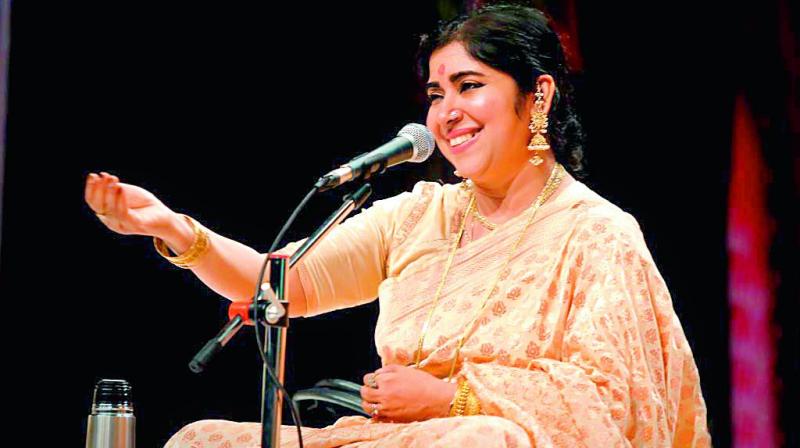Lofty khayal

We catch her singing a line from the song Jhumka gira re a classic from the movie Mera Saaya even as she readied herself for a performance in the city recently. The vibrant Dr Soma Ghosh is a positive force on India’s Hindustani Classical music scene. We get her to voice her views about the fusion music and remixes we hear today. “Famous musicians like RD Burman got folk music to Bollywood with so much dedication and honesty. But nowadays, there is a new musician every day with not much knowledge. And no offence, but this is why most of them settle for remixes,” she speaks candidly. She elaborates, “The songs they make now are seasonal. They gain popularity for a short period and soon people forget about them. But, the classic songs from the 80s and earlier are immortal. Listening to them evokes a sense of peace and serenity.”
This critique comes not from a dislike of new singers, but from her deep passion for music that she has followed and honed for a large part of her life. When you have the love and passion for anything, believing in your abilities and sincerely dedicating your time and efforts to it is most important. That’s what Dr Soma Ghosh did for music from the tender age of three.
Reminiscing about her childhood, when her love for music was first inculcated, she says, “I am from a cultural family in Varanasi. My mother, Archana Chakravarty, was a singer and a music teacher. She always told me that she believed I was a born music lover. My mother noticed that I have the innate ability to understand the sur and taal.”
Post her under-graduation in literature, Dr Soma pursued her higher education in music, with a master’s degree and a PhD in ‘chhota khayal’ (a modern genre of Hindu Classical music). She then expanded her ambit of knowledge under the esteemed guidance of her guru Bageshwari Devi. She specialised in the genres that symbolise Banaras singing, like Thumri, Tappa, Hori, Chaiti, Kajari, Dadra and Ghazal.
Speaking about her days with her guru Dr Soma says, “Bageshwari Devi was an epitome of talent and she carried herself with poise and class. She eventually succumbed to the fear of not getting the life she wanted and died of a heart attack.”
Dr Soma was heartbroken at this loss and in memory of her guru she hosted a concert and invited Ustaad Bismillah Khan to perform as he was Bageshwari’s favourite singer. “It was in this event that Ustaad Bismillah Khan enjoyed my performance so much that he chose to adopt me as his daughter. After accepting his Bharat Ratna award in 2001, his first concert was a jugalbandi with me. I was overwhelmed with his love and respect for my talent and I asked him why he chose me from so many other skilled musicians. He said music doesn’t choose people, rather it is their perseverance that recognises their talent,” she recalls proudly.
Speaking about her future plans, she says, “Ustaadji always said to me that the main reason why most talented musicians move abroad is because we lack facilities. He told me to work on that and provide adequate facilities to aspiring musicians. So, I aim to build a ‘Sangeet village’, where both the teachers and the students will be given ample amenities and facilities to pursue their love for music.”

